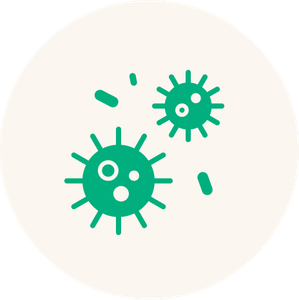More plant points mean a more diverse diet. Aim for 30 plant points each week to support a healthy gut microbiota and lower the risk of cognitive decline, depression and type 2 diabetes. 🌱🥗

Protein keeps us feeling full and supports healthy bones and muscles—essential for healthy ageing. But the source matters: more plant-based protein is linked to extra health benefits, likely due to added fibre and polyphenols.

This meal sets you on track for 30g of fibre per day. Increasing your fibre intake can reduce heart disease risk by up to 30% and improve brain function. 🧠

These live microorganisms increase the richness and diversity of beneficial microbes in the gut – which can aid digestion, lower inflammation and help with obesity, allergic diseases and high cholesterol. Recent studies suggest they could even sharpen the mind and improve mood. 🦠🧠

They ‘feed’ beneficial gut bacteria which support gut and immune health, and may even influence brain function through the gut-brain axis. 🦠🧠

They are packed with essential nutrients, fibre and phytochemicals that help lower inflammation, improve cholesterol levels and protect against DNA damage. Eating 800g or 10 portions every day is tied to a lower risk of heart disease, stroke and early death. 🥦🍎

They add polyphenols with antioxidant and anti-inflammatory effects that could help lower the risk of chronic diseases. Each spice adds ¼ plant point, which increases diet variety and supports a healthy gut microbiome. 🌱

Eating 1-2 servings of legumes daily can improve cholesterol levels, lower the risk of heart disease and cut cancer mortality by almost half (49%). They are rich in protein and dietary fibres, which help control glucose levels after eating and support beneficial gut microbes. 💪🫘

Eating 1-2 servings of leafy green vegetables every day is tied to a lower risk of heart disease, type 2 diabetes and cognitive decline – the equivalent of being 11 years younger! 💡🥬

Soybeans are packed with protein and isoflavones, which can help lower cholesterol and ease menopausal symptoms. Despite some claims, research shows soy doesn’t affect testosterone levels and may even lower breast cancer risk.


